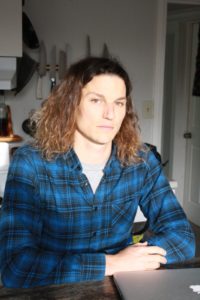A Camosun student has expressed concern over the college charging for certain 100-level courses instead of offering them as free 000-level Adult Basic Education (ABE) courses. First-year Camosun University Transfer student Ryan Moen says that the college’s wording about some courses is confusing, pointing to Math 173 as an example.
“It advertises itself as a high-school equivalency,” says Moen.
The Camosun website lists some 100-level courses as Grade 11 and 12 alternative courses. Moen says that he doesn’t believe there’s any difference between Math 072 and 073, which are ABE courses funded by the government, and Math 173, which the college charges tuition for because it’s a 100-level course. But Camosun vice president of education John Boraas says that the courses are different, and that the college’s system of charging for these courses is not unique.

“This is something that has happened all across post-secondary,” says Boraas. “I think you can look at any university and there will be 100-level courses that identify that it is sufficient to be taken instead of a Math 12 or a Math 11.”
Boraas says some of these pricing decisions came during a tough financial time when the college had to make some difficult budgetary decisions.
“We were struggling to meet demand, and at that time the government was absolutely not providing additional resources,” he says. “We were not in a great place financially, so we created courses that would allow us to add capacity because we had demand beyond what we could deliver in the ABE area, which, at that time, was tuition-free.”
Moen says Camosun is doing a fairly good job at making education accessible. The real issue, as far as he’s concerned, is government funding.
“I’m super supportive of Camosun’s role in this. Camosun, I’m sure, would offer any course they could; it’s whether or not they can make sure that it’s funded so that Camosun can exist to be a huge access and resource for the south island,” he says. “The biggest question is the current government and why they decided to offer something [when] they had no idea what they were offering. They kind of created a mess.”
Provincial minister of advanced education, skills and training Melanie Mark was unavailable to comment by deadline.
Camosun College Student Society (CCSS) student services coordinator Michael Glover says the idea of high-school courses being paid for by the government “has long been established.” Glover says the college needed to be able to charge tuition for some of the courses, so they made changes to them, with the end result being some students who thought they would be getting free courses finding out that they had to pay for them.
“They created some 100-level courses that were ABE courses with enhanced content,” says Glover. “So students who found themselves in these courses as prerequisites for the courses they were about to do went, ‘Good news—my courses are going to be free, because I’m taking this course to upgrade so that I can get into these other courses, so that makes it an Adult Basic Education course.’”
Boraas says the college will be doing a review of the ABE program to make sure the pricing policies are fair.
“The question is a good one,” says Boraas. “Technically, the courses have enough differences that it’s legitimate, but the question remains that they’re very similar courses.”
Boraas adds that the decision to charge for some courses was not ideal.
“Would I identify it as ideal and a completely transparent practice? No, I wouldn’t, but it’s consistent with what the system has done, and, as I say, there are enough differences, but definitely they can be used for that purpose,” says Boraas. “Some students would rather have a 100-level course on their transcript and sometimes get credit, some students would rather have it be tuition-free, so it’s giving both groups kind of what they want.”
Boraas says that if a student takes University Transfer courses and an ABE course, they are not eligible for student loans. He says this was a factor in coming up with some enhanced courses—which are similar, but not identical, to existing courses—that would make students eligible for loans.
“We’re reviewing all of our access delivery in light of lots of legislative changes, so if people have concerns, they’re welcome to submit them and it will be part of what we look at and examine,” says Boraas.
Moen acknowledges that 100-level courses will never be free; he says that it’s not just at Camosun that this happens, and that it all comes down to government funding.
“The different distance education places have to figure out ways to do this viably, because, yes, they are somewhat funded by the province, but if they were to offer all these courses, pay the instructors… At the end of the day, if the cheque doesn’t come through through the government, they won’t exist.”
